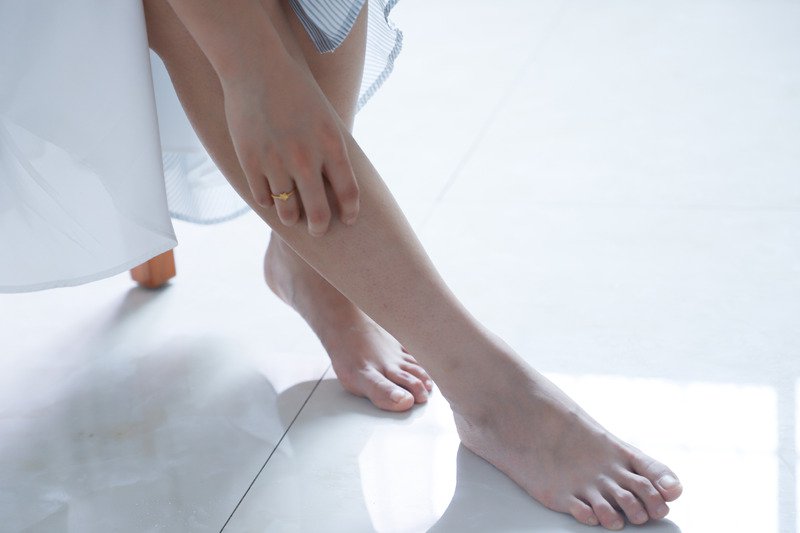Psoriasis is a common skin disease that affects the life cycle of skin cells. Normally, new cells take about a month to move from the lowest skin layer where they’re produced, to the outermost layer where they die and flake off. With psoriasis, the entire life cycle takes only days. As a result, cells build up rapidly, forming thick silvery scales and itchy, dry, red patches that are sometimes painful.
Psoriasis is a persistent, long-lasting (chronic) disease. You may have periods when your psoriasis symptoms improve or go into remission alternating with times your psoriasis becomes worse.
For some people, psoriasis is just a nuisance. For others, it’s disabling, especially when associated with arthritis. No cure exists, but psoriasis treatments may offer significant relief. And self-care measures, such as using a nonprescription cortisone cream and exposing your skin to small amounts of ultraviolet light, can improve your psoriasis symptoms.
Common Symptoms of Psoriasis
Psoriasis symptoms can vary from person to person but may include one or more of the following:
- Red patches of skin covered with silvery scales
- Small scaling spots (commonly seen in children)
- Dry, cracked skin that may bleed
- Itching, burning or soreness
- Thickened, pitted or ridged nails
- Swollen and stiff joints
Psoriasis patches can range from a few spots of dandruff-like scaling to major eruptions that cover large areas. Mild cases of psoriasis may be a nuisance. But more severe cases can be painful, disfiguring and disabling. Most types of psoriasis go through cycles, flaring for a few weeks or months, then subsiding for a time or even going into complete remission. In most cases, however, the disease eventually returns.
Types of Psoriasis
Several types of psoriasis exist. These include:
- Plaque Psoriasis: The most common form, plaque psoriasis causes dry, red skin lesions (plaques) covered with silvery scales. The plaques itch or feel sore and may occur anywhere on your body, including your genitals and the soft tissue inside your mouth. You may have just a few plaques or many, and in severe cases, the skin around your joints may crack and bleed.
- Nail Psoriasis: Psoriasis can affect fingernails and toenails, causing pitting, abnormal nail growth and discoloration. Psoriatic nails may become loose and separate from the nail bed (onycholysis). Severe cases may cause the nail to crumble.
- Scalp Psoriasis: Psoriasis on the scalp appears as red, itchy areas with silvery-white scales. You may notice flakes of dead skin in your hair or on your shoulders, especially after scratching your scalp.
- Guttate Psoriasis: This primarily affects people younger than 30 and is usually triggered by a bacterial infection such as strep throat. It’s marked by small, water-drop-shaped sores on your trunk, arms, legs and scalp. The sores are covered by a fine scale and aren’t as thick as typical plaques are. You may have a single outbreak that goes away on its own, or you may have repeated episodes, especially if you have ongoing respiratory infections.
- Inverse Psoriasis: Mainly affecting the skin in the armpits, groin, under the breasts and around the genitals, inverse psoriasis causes smooth patches of red, inflamed skin. It’s more common in overweight people and is worsened by friction and sweating.
- Pustular Psoriasis: This rare form of psoriasis can occur in widespread patches (generalized pustular psoriasis) or in smaller areas on your hands, feet or fingertips. It generally develops quickly, with pus-filled blisters appearing just hours after your skin becomes red and tender. The blisters dry within a day or two but may reappear every few days or weeks. Generalized pustular psoriasis can also cause fever, chills, severe itching, weight loss and fatigue.
- Erythrodermic Psoriasis: The least common type of psoriasis, erythrodermic psoriasis can cover your entire body with a red, peeling rash that can itch or burn intensely. It may be triggered by severe sunburn, by corticosteroids and other medications, or by another type of psoriasis that’s poorly controlled.
- Psoriatic Arthritis: In addition to inflamed, scaly skin, psoriatic arthritis causes pitted, discolored nails and the swollen, painful joints that are typical of arthritis. It can also lead to inflammatory eye conditions such as conjunctivitis. Symptoms range from mild to severe. Although the disease usually isn’t as crippling as other forms of arthritis, it can cause stiffness and progressive joint damage that in the most serious cases may lead to permanent deformity.
What Causes Psoriasis?
The cause of psoriasis is related to the immune system, and more specifically, a type of white blood cell called a T lymphocyte or T cell. Normally, T cells travel throughout the body to detect and fight off foreign substances, such as viruses or bacteria. In people with psoriasis, however, the T cells attack healthy skin cells by mistake as if to heal a wound or to fight an infection.
Overactive T cells trigger other immune responses that cause an increased production of both healthy skin cells and more T cells. What results is an ongoing cycle in which new skin cells move to the outermost layer of skin too quickly – in days rather than weeks. Dead skin and white blood cells can’t slough off quickly enough and build up in thick, scaly patches on the skin’s surface. This usually doesn’t stop unless treatment interrupts the cycle. Just what causes T cells to malfunction in people with psoriasis isn’t entirely clear, although researchers think genetic and environmental factors both play a role.
Psoriasis Triggers
Psoriasis typically starts or worsens because of a trigger that you may be able to identify and avoid. Factors that may trigger psoriasis include:
- Infections, such as strep throat or thrush
- Injury to the skin, such as a cut or scrape, bug bite, or a severe sunburn
- Stress
- Cold weather
- Smoking
- Heavy alcohol consumption
- Certain medications, including lithium, which is prescribed for bipolar disorder, high blood pressure medications such as beta blockers, antimalarial drugs and iodides
Risk Factors
Perhaps the most significant risk factor for psoriasis is having a family history of the disease. About one in three people with psoriasis has a close relative who also has the condition. On the other hand, roughly the same proportion of people carries genes that have been linked to psoriasis yet never develop skin problems, indicating just how complex and perplexing psoriasis is.
Other Psoriasis Risk Factors Include:
- Other Medical Conditions
People with HIV are more likely to develop psoriasis than people with healthy immune systems are. Children and young adults with recurring infections, particularly strep throat, may also be at increased risk. - Stress
Because stress can have a strong impact on your immune system, high stress levels may increase your risk of psoriasis. - Obesity
Excess weight increases your risk of inverse psoriasis. In addition, plaques associated with all types of psoriasis often develop in skin creases and folds. - Smoking
Smoking tobacco not only increases your risk of psoriasis but also may increase the severity of the disease. Smoking may also play a role in the initial development of the disease.
When To Call Us:
- If you suspect that you may have psoriasis
- If you have psoriasis and it progresses beyond the nuisance stage, causing you discomfort and pain
- If your psoriasis makes performing routine tasks difficult
- If your psoriasis causes you concern about the appearance of your skin
- If your signs and symptoms worsen or they don’t improve with treatment
- You may need a different medication or a combination of treatments to manage psoriasis
Schedule an appointment with a caring provider at one of our convenient locations to have your skin examined or to discuss psoriasis treatment recommendations.














